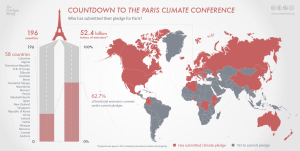7 September 2015, The Carbon Brief, Paris 2015: Tracking country climate pledges. 31 March marked the loose deadline for countries to submit their pledges to the UN on how far they intend to reduce their greenhouse gas emissions. These promises, known as “intended nationally determined contributions”, or INDCs, will determine the success of the deal that the UN hopes to sign off in Paris in December this year. While only five countries plus the EU made the deadline, more than a hundred others are expected to filter in throughout the coming eight months. Carbon Brief is tracking the pledges made by each country. We’ll update this post as each INDC comes in. To find out exactly what an INDC is and why it matters, read our INDC explainer. Read More here
Tag Archives: UNFCCC
11 June 2015, Common Dreams: As Bonn Climate Talks Conclude, Another Failure for Planet Earth, Humanity. Developed countries criticized for being unwilling to buck fossil fuel industry and make necessary transition to renewable energy sources. As ten days of UN-sponsored climate talks came to end in Bonn, Germany on Thursday morning, global campaigners demanding far-reaching solutions to the crisis of a warming planet expressed dissatisfaction on multiple levels, charging that the continued foot-dragging of governments is sentencing future generations to unparalleled catastrophe even as scientists issue grave new warnings about the dangers of inaction. Speaking on behalf of Friends of the Earth, Lucy Cadena, the group’s climate justice and energy coordinator, said the among the deepest frustrations is that while solutions are available to stave off the worst impacts of climate change, Bonn has once again proven that leaders from the most developed countries are unwilling to buck the fossil fuel industry and make the urgent transition to renewable energy sources. Read More here
11 June 2015, Carbon Brief, In depth: Trust high but progress slow at UN climate talks in Bonn: Diplomats have completed the latest round of UN talks on climate change, intended to whittle down a draft text into something that could form the basis of a UN climate agreement this December. Negotiators managed to cut down the sprawling text, which they agreed in Geneva earlier this year – a 90-page document containing all the views of all countries. After two weeks of negotiations, the text now stands at 85 pages, or 2,730 words shorter than before. The final deal signed in Paris is expected to come in at around 15 pages, which gives some indication of the scale of work needed over the next six months, if the summit is to be a success…. Nonetheless, the rush of nationally determined pledges that many expected would be offered in Bonn failed to emerge, with just Morocco and Ethiopia coming forward with new targets to cut their emissions after 2020. Bonn also finalised rules on reducing emissions from deforestation and forest degradation (REDD+), preparing the way for progress on the ground. The conclusion was one of the few landmark moments to emerge during the session: discussions on deforestation have stretched on for the past ten years…. Read More here

